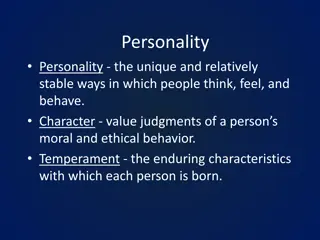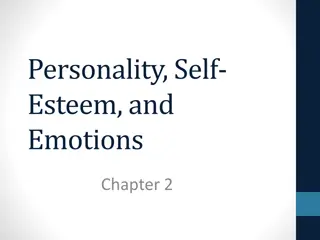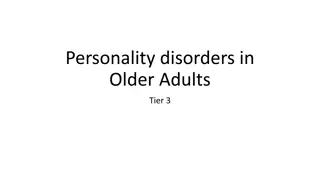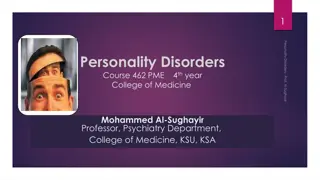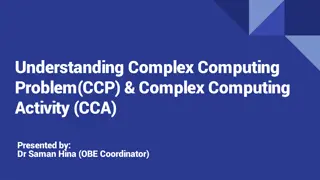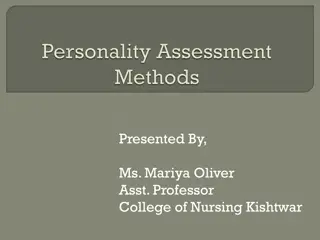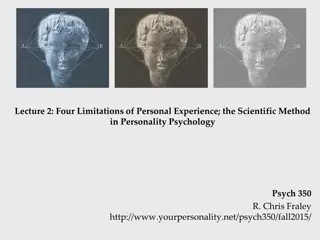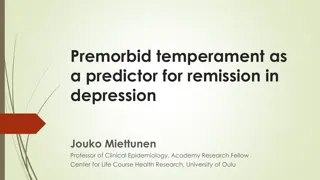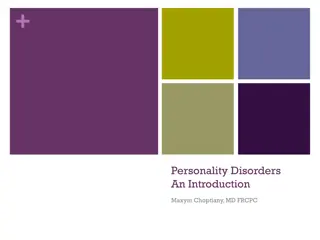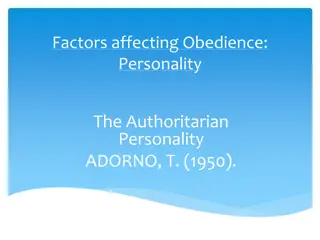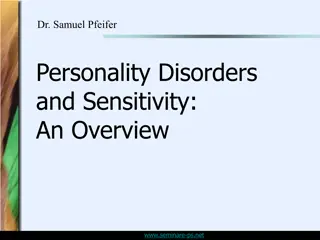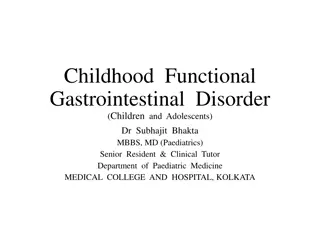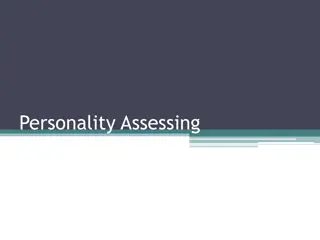Understanding Personality Disorders with Dr. Farrukh Hashmi, MD
Dr. Farrukh Hashmi, a board-certified psychiatrist at Lourdes Counseling Center and Reliance Medical Clinics in Richland, WA, specializes in personality disorders. He has no financial relationships with ineligible companies. Gain expert insight and guidance on addressing personality disorders from a reputable professional in the field.
Download Presentation

Please find below an Image/Link to download the presentation.
The content on the website is provided AS IS for your information and personal use only. It may not be sold, licensed, or shared on other websites without obtaining consent from the author. Download presentation by click this link. If you encounter any issues during the download, it is possible that the publisher has removed the file from their server.
E N D
Presentation Transcript
PERSONALITY DISORDERS FARRUKH HASHMI, MD BOARD-CERTIFIED PSYCHIATRIST LOURDES COUNSELING CENTER RICHLAND, WA RELIANCE MEDICAL CLINICS RICHLAND, WA
DISCLOSURE STATEMENT: Dr. Farrukh Hashmi has no relevant financial relationships with ineligible companies to disclose.
GENERAL PERSONALITY DISORDER DSM V defines a general personality disorder as an enduring pattern of behavior and inner experiences that deviates significantly from the individual's cultural standards; is rigidly pervasive; has an uncertain adolescence or early adulthood; is stable through time; leads to unhappiness and impairment; and manifest in at least two of the following four areas: Cognition, Affectivity, Interpersonal Function, or Impulsive Control.
The enduring pattern is inflexible and pervasive across a broad range of personal and social situations. The enduring pattern leads to clinically significant distress or impairment in social occupational or other important areas of functioning. The pattern is stable and of long duration, and its onset can be traced back at least to adolescence or early adulthood. The enduring pattern is not better explained as a manifestation or consequence of another mental disorder. The enduring pattern is not attributable to the psychological effects of a substance or another medical condition.
ETIOLOGY Genetic factors Biological factors: hormones, platelet monoamine oxidase, smooth pursuit eye movements, neurotransmitters. Psychoanalytic factors: Sigmund Freud suggested that personality traits are related to fixation at one psychosexual stage of development. Defense mechanisms: fantasy, dissociation, isolation, rejection, splitting, passive aggression, acting out.
TYPES OF PERSONALITY DISORDERS Paranoid personality disorder Schizoid personality disorder Schizotypal personality disorder
TYPES OF PERSONALITY DISORDERS Antisocial personality disorder Borderline personality disorder Histrionic personality disorder Narcissistic personality disorder
TYPES OF PERSONALITY DISORDERS Avoidant personality disorder Dependent personality disorder Obsessive compulsive personality disorder Sadistic personality disorder (not included in DSM V, but it still appears in literature and may be of a descriptive use)
CLUSTER A Persons with paranoid personality disorder are characterized by long-standing suspiciousness and mistrust of persons in general. They refuse responsibility for their own feelings and assign responsibility to others. They are often hostile, irritable, and angry. Bigots , injustice collectors, pathologically jealous spouses, and litigious cranks often have paranoid personality disorder.
CLUSTER A Schizoid personality disorder is characterized by a lifelong pattern of social withdrawal. Persons with schizoid personality disorders are often seen by others as eccentric, isolated, or lonely. Their discomfort with human interaction; their introversion; and their bland, constricted affect are noteworthy.
CLUSTER A Persons with schizotypal personality disorder are strikingly odd or strange, even to lay persons. Magical thinking, peculiar notions, ideas of reference, illusions, and derealization are part of a schizotypal person s everyday world. They do have relationships and may get married.
CLUSTER B Antisocial personality disorder is an inability to conform to the social norms that ordinarily govern many aspects of a person s adolescent and adult behavior. Although characterized by continual antisocial or criminal acts, the disorder is not synonymous with criminality.
CLUSTER B Patients with borderline personality disorder stand on the border between neurosis and psychosis, and they are characterized by extraordinarily unstable affect, mood, behavior, object relations and self image. This disorder has also been called ambulatory schizophrenia, as-if personality, pseudo neurotic schizophrenia, and psychotic character disorder. It is also described as emotionally unstable personality disorder in ICD 10
CLUSTER B Persons with histrionic personality disorder are excitable and emotional and behave in a colorful, dramatic, extroverted fashion. Accompanying their flamboyant aspect, however, is often an inability to maintain deep, long-lasting attachments.
CLUSTER B Persons with narcissistic personality disorder are characterized by a heightened sense of self-importance, lack of empathy, and grandiose feelings of uniqueness. Underneath, however, their self-esteem is fragile and vulnerable to even minor criticism.
CLUSTER C Obsessive compulsive personality disorder is characterized by emotional constriction, orderliness, perseverance, stubbornness, and indecisiveness. The essential feature of the disorder is a pervasive pattern of perfectionism and inflexibility.
CLUSTER C Persons with the avoidant personality disorder show extreme sensitivity to rejection and may lead socially withdrawn lives. Although shy, they are not asocial and show a great desire for companionship, but they need unusually strong guarantees of uncritical acceptance. Such persons are commonly described as having an inferiority complex.
CLUSTER C Persons with dependent personality disorder subordinate their own needs to those of others, get others to assume responsibility for major areas of their lives, lack self-confidence and may experience intense discomfort when alone for more than a brief period. The disorder has been called passive dependent personality. Freud described an oral-dependent personality dimension characterized by dependence, pessimism, fear of sexuality, self- doubt, passivity, suggestibility and lack of perseverance.
OTHER PERSONALITY DISORDERS Passive aggressive personality was once considered a psychiatric diagnosis, but it's no longer classified as such. It is included here because persons with the personality type are not uncommon. Persons with passive aggressive personality are characterized by covert obstructionism, procrastination, stubbornness, and inefficiency. Such behavior is a manifestation of passively expressed underlying aggression.
UNSPECIFIED PERSONALITY DISORDERS Persons with depressive personality are characterized by lifelong traits that fall along the depressive spectrum. They are pessimistic, anhedonic, self doubting, duty-bound and chronically unhappy. Melancholic personality was described by early 20th century European psychiatrists.
OTHER SPECIFIED PERSONALITY DISORDERS Some personality types are characterized by elements of sadism or masochism or a combination of both. Sadomasochistic personality is listed here because it is of major clinical and historical interest in psychiatry. It is not an official diagnostic category in DSM V but it can be diagnosed as personality disorder not otherwise classified.
OTHER SPECIFIED PERSONALITY DISORDERS Sadistic personality is not included in the DSM V, but it still appears in the literature and may be of descriptive use. Beginning in early adulthood, person with sadistic personality show a pervasive pattern of cruel, demeaning and aggressive behavior that is directed toward others. Physical cruelty or violence is used to inflict pain on others not to achieve another goal, such as mugging a person to steal. Persons with sadistic personality like to humiliate or demean persons in front of others and have usually treated or disciplined persons uncommonly harshly, especially children. In general persons with sadistic personality are fascinated by violence, weapons, injury, or torture. Included in this category, such persons cannot be motivated solely by the desire to drive sexual arousal from their behavior, if they are so motivated the paraphilia of sexual sadism should be diagnosed.
TREATMENT OF PERSONALITY DISORDERS Paranoid personality disorder: psychotherapy; therapist should be straightforward in all their dealings with these patients. Professional and not overly warm style from therapist is preferred. Pharmacotherapy: antianxiety and sometimes antipsychotic medication can be helpful. Schizoid personality disorder: psychotherapy; similar to paranoid personality disorder. Pharmacotherapy: small doses of anti-psychotic, anti-depressants and psychostimulants are beneficial, and some patients set up urgent medicines made special class sensitive to rejection, anxiolytic medicines may be helpful to diminish anxiety. Schizotypal personality disorder: psychotherapy similar to schizoid and paranoid personality disorder. Patients may have peculiar patterns of thinking and some more involved in cults, strange religious practices. Therapist must be sensitive to these and must not ridicule such activities or be judgmental about these beliefs or activities. Pharmacotherapy includes antipsychotic medications that may be helpful in dealing with ideas of reference illusions and other symptoms of the disorder. Sometimes antidepressants are also useful when a depressive component of the personality is present.
TREATMENT OF CLUSTER B PERSONALITY DISORDERS Antisocial personality disorder: psychotherapy; firm limit settings are essential. Therapist must find ways of dealing with the patient's self-destructive behavior and to overcome patient's fear of intimacy. Therapist deal with the challenge of separating control from punishment and separating help and confrontation from social isolation and retribution. Pharmacotherapy helps with anxiety, rage, depression and mood issues. Borderline personality disorder: psychotherapy for patients with borderline personality disorder is an area of intense investigation and has been the treatment of choice. For best results, pharmacotherapy has been added to the treatment regimen. CBT, DBT are useful especially for the patient with cutting behaviors. Pharmacotherapy such as a typical antipsychotics are helpful to control anger hostility and brief psychotic episodes. Antidepressants also help. Medications are to be selected carefully and keeping in mind the side effects.
TREATMENT OF CLUSTER B PERSONALITY DISORDERS Histrionic personality disorder: patients with histrionic personality disorder are often unaware of their own real feelings. Clarification of their inner feeling is an important therapeutic process. Psychoanalytically oriented psychotherapy, whether group or individual is probably the treatment of choice for histrionic personality disorder. Pharmacotherapy can be objective when symptoms are targeted like depression. Anxiety medicines are also helpful, as well as antipsychotic medications if needed. Narcissistic personality disorder: because patients must renounce their narcissism to make progress, the treatment of narcissistic personality disorder is difficult. Psychoanalytic approaches affect change, but much research is still required to validate the diagnosis and to determine the best treatment. Some clinicians advocate group therapy for these individuals. Pharmacotherapy lithium has been used with patients who have mood swings and antidepressants help patients who feel depressed.
TREATMENT OF CLUSTER C Avoidant personality disorder: psychotherapy is beneficial. Therapist must develop alliance and trust and must convey an accepting attitude toward the patient's fears, especially the fear of rejection. The therapist eventually encourages the patient to move out into the world. Failure can reinforce patient fears. Group therapy may be helpful. Pharmacotherapy for anxiety and depression: some patients get benefit from Beta adrenergic medications, such as atenolol. Dependent personality disorder: psychotherapy include insight-oriented therapies. Goal is to make the patient more independent and improve self- esteem, assertiveness and self-reliance. Sometimes family dynamics becomes an issue in therapy. Pharmacotherapy can be helpful for anxiety and depression
TREATMENT OF CLUSTER C Obsessive compulsive personality disorder: unlike patient with other personality disorders, those with obsessive compulsive personality disorder are often aware of their suffering and they seek treatment on their own. Group therapy and behavioral therapy occasionally offer certain advantages. Pharmacotherapy, includes benzodiazepines such as clonazepam have helped reduce symptoms also medication like clomipramine, fluoxetine are helpful.
CONCLUSION Personality disorders must be diagnosed and treated over a period of time. Please do not diagnose personality disorders on a brief interaction. Patients with personality disorders usually don't seek help but its the family members/friends or other people who are affected by these disorders that encourage the patient to seek help. Psychotherapies like CBT, DBT, insight-oriented therapy are the mainstay of treatment for these patients . Medications do help but should be used judicially and with the target in mind.
References: 1. Kaplan and Sadock s textbook of Clinical Psychiatry 2. DSM-5 3. Current diagnosis and treatment Psychiatry 4. Core Psychiatry 2nd Edition.
RISKS AND COMPLICATIONS OF SOCIAL ISOLATION
Physical isolation versus Social isolation COVID-19 Pandemic and Social isolation
Social isolation typically refers to solitude that is unwanted and unhealthy Socially isolated people may lack friends or close coworkers and they often feel lonely or depressed. They can suffer from low self-esteem or anxiety. Isolation and loneliness Working from home and its benefits and consequences Financial impact on person and community
COVID-19 related isolations lead to restriction and assembly of people, cancellation of planned social events, travel restrictions, drastically altering daily way of life. Separation from family and friends Effect of isolation on older people Departure from everyday routines
CONSEQUENCES OF SOCIAL ISOLATION Mental and physical health consequences Acute stress disorder, irritability, insomnia, emotional distress, mood disorders, depression, fear and panic, anxiety, stress due to financial concerns, frustration and boredom, loneliness, poor communications, PTSD behavior. Cardiac issues, respiratory system issues, G.I. issues. Death of a loved one Fear of unknown Substance abuse including alcohol and drugs Domestic violence Child abuse
PREVENTING SOCIAL ISOLATION AND ITS TREATMENT Self-care, engaging in relaxing activities exercise reading listening to the music meditation and prayer and hobbies Follow healthy routines Stay connected via phone calls, social media, emails, video-calling etc. Stay informed and avoid rumors and misinformation Engage in therapy including cognitive behavioral therapy, exposure therapy Departure from everyday routines. Consult with medical and mental health providers visa tele-medicine or tele- psychiatry if physically cannot be seen by providers


